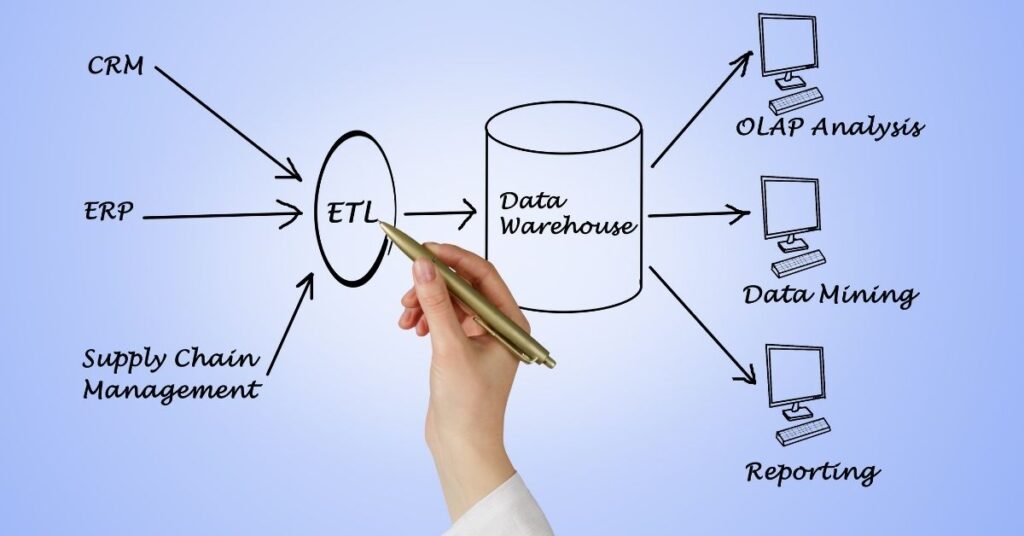Data Warehouse in Data Mining: In the ever-evolving world of data mining, a data warehouse in data mining plays a pivotal role. As companies generate and collect vast amounts of data daily, it becomes crucial to structure and organize this data for efficient analysis and decision-making.
A data warehouse is the backbone that allows businesses to store, manage, and analyze data from multiple sources.
In this blog, we’ll explore the role of a data warehouse in data mining, the different types, functions, benefits, and much more, helping you understand its importance in modern data-driven decision-making.
What is Data Warehouse in Data Mining?
A data warehouse in data mining refers to a centralized repository that stores large volumes of data from different sources. The data in a warehouse is usually cleaned, organized, and optimized for querying and analysis. In data mining, these organized data sets are crucial for identifying patterns, trends, and insights that can guide business strategies and decisions.
The role of data warehousing in data mining is to provide a foundation for business intelligence by enabling access to historical data, which is essential for effective decision-making.

Importance of Data Warehouse in Data Mining
The importance of data warehouse in data mining cannot be overstated. It simplifies the process of data extraction and reporting, making it easier for analysts to mine data. Without a properly organized data warehouse, businesses would struggle to retrieve and analyze data efficiently.
Key Features of Data Warehouse
Some of the key features of data warehouse that make it invaluable in data mining include:
- Data Integration – Collects and integrates data from multiple sources, including internal and external systems.
- Time-Variant Data – Stores historical data, allowing for trend analysis over time.
- Non-Volatility – Once the data is stored, it does not change, ensuring data consistency.
- Subject-Oriented – Organized by subject areas, making it easier for analysts to query.
These features ensure that businesses have structured, accurate, and timely data to support data mining activities.
Types of Data in Data Warehouse
A data warehouse in data mining is designed to handle various types of data, which can be broadly classified into:
- Structured Data – Data that is highly organized and stored in tables, such as customer information or transaction data.
- Semi-Structured Data – Data that does not fit neatly into traditional tables but still contains tags and markers for easy analysis, such as JSON or XML data.
- Unstructured Data – Data without a predefined format, such as videos, social media posts, or emails.
The ability to manage and analyze all these types of data makes a data warehouse invaluable in the context of data mining.
Functions of Data Warehouse
The functions of data warehouse are designed to help organizations manage and extract valuable insights from data. Here are some key functions:
- Data Collection and Integration – A data warehouse collects data from various sources and integrates them into a single platform.
- Data Storage – It stores historical data in an organized manner, making it easy to retrieve and analyze.
- Data Processing – It processes data through various tools, such as ETL (Extract, Transform, Load) tools, to clean and organize data before storage.
- Data Analysis – Analysts can use data mining techniques to explore the data, uncover patterns, and derive actionable insights.
- Reporting and Visualization – Data warehouses support easy reporting and visualization of data, which aids in decision-making.

Benefits of Data Warehouse in Data Mining
The benefits of data warehouse in data mining are numerous and impactful for businesses. Here’s how data warehouses benefit organizations:
- Improved decision making: With organized and accurate data, businesses can make informed decisions, backed by insights derived from historical trends.
- Faster Querying and Reporting: The optimized structure of data warehouses makes querying faster and more efficient, which is essential for real-time data analysis.
- Data consolidation: Data warehouses bring together information from disparate sources, enabling a unified view of data.
- Increased productivity: By automating data collection and storage, businesses can free up time for analysts to focus on high-level tasks, such as predictive analytics and data mining.
Advantages and Disadvantages of Data Warehouse
While the advantages of data warehouse are plentiful, it’s essential to consider the challenges as well:
Advantages of data warehousing:
- Centralized data: A single source of truth for all business data.
- Enhanced business intelligence: Provides the foundation for data mining and analysis, empowering data-driven decisions.
- Time efficiency: Allows for quick access to large volumes of data, improving efficiency.
Disadvantages of data warehousing:
- High costs: Implementing and maintaining a data warehouse can be expensive for smaller businesses.
- Complexity: Data warehouses can be complex to set up, requiring skilled personnel.
- Data redundancy: Storing large amounts of data from various sources can sometimes lead to data redundancy.
Characteristics of Data in Data Warehouse
Understanding the characteristics of data in data warehouse is vital to ensuring its effectiveness for data mining:
- Consistency: Data is cleaned and formatted to be consistent across the entire system.
- Time-variant: Data reflects changes over time, which is critical for historical analysis.
- Non-volatile: Once data is loaded into the warehouse, it remains unchanged, providing a stable source of information for analysis.
How ZELL’s Data Science And Data Analytics Courses Can Help You!
For those interested in pursuing a career in data mining and warehousing, Ze Learning Labb (ZELL) offers courses in Data Mining and Data Warehousing. These courses not only cover the theoretical aspects but also provide hands-on training to build practical skills.
ZELL’s courses include:
- Data Mining Techniques – Learn advanced techniques in data mining, including clustering, regression, and association rules.
- Data Warehousing Concepts – Understand the architecture and implementation of data warehouses.
- Big Data Analytics – Explore how big data impacts data mining and the role of data warehouses in handling large-scale data.
By enrolling in these courses, you can get the skills needed to excel in the world of data mining and warehousing.

On A Final Note…
A data warehouse in data mining is a powerful tool that supports effective decision-making by organizing and storing large volumes of data. Understanding its role, functions, benefits, and challenges is crucial for anyone working in data mining or data analytics.
The importance of data warehouse lies in its ability to consolidate, store, and manage data, providing a robust foundation for businesses to mine insights and drive growth. Whether you are a beginner or an advanced professional in data science, grasping the essentials of data warehousing will empower you to leverage the full potential of data mining techniques.
Get in touch with us NOW!





